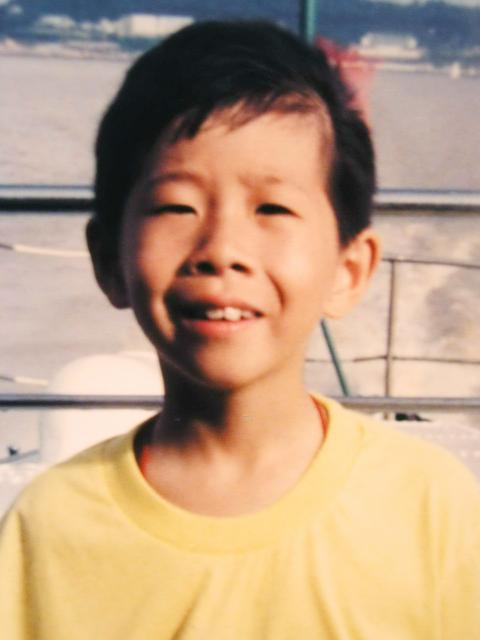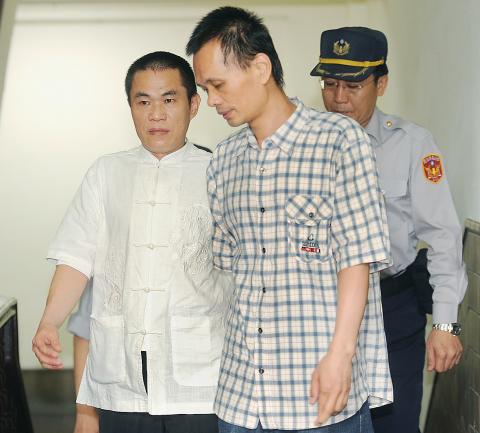Chiou Ho-shun (邱和順) exhausted his final appeal yesterday when the Supreme Court reaffirmed a death sentence for kidnapping and murdering a nine-year-old boy more than two decades ago.
The decision ends the nation’s longest-running legal battle, which saw the case shuffled back and forth between various courts, with allegations by judicial reform advocates that evidence was acquired through torture and forced confessions.
The Supreme Court yesterday ruled that Chiou, detained for most of his adult life, received a fair trial and deserved to die for his 1987 slaying of Lu Cheng (陸正), a boy that prosecutors said he kidnapped, dismembered and then threw in the ocean after a botched kidnapping.

Photo: Courtesy of Lu Cheng’s family
He was also found guilty of the separate robbery and murder of an insurance agent who had just won a lottery-like game popular at the time — receiving another death penalty verdict in the same ruling.
A spokesperson for his pro bono legal team, Lin Feng-jeng (林峰正), called the decision “unacceptable,” saying that the abrupt finding came before the court had time to finish reviewing new information provided by the defense.
“The Supreme Court used two months to affirm a controversial ruling from a lower court in a 23-year-old case. It’s too soon and we believe it to be completely unacceptable that a person’s life can be decided this way,” Lin said.

Photo: Liao Chen-huei, Taipei Times
However, the ruling cited overwhelming proof in support of the verdict, based on eyewitness accounts and other evidence.
Chiou and several accomplices are said to have kidnapped the nine-year-old boy when he was walking home from school on Dec. 21, 1987, in a case that dominated media headlines at the time. Prosecutors said Lu resisted the kidnap attempt by Chiou’s girlfriend and was killed after he bit Chiou’s finger.
Prosecutors said that when Lu’s parents later received a ransom note for NT$5 million (US$173,000), the boy was already dead, having been dumped off the coast of Hsinchu County after being dismembered. The boy’s parents paid NT$1 million to the captors.
After a tip-off in September the following year, police arrested three suspects, who quickly confessed to the kidnapping and also the separate murder of Ko Hung Yu-lan (柯洪玉蘭), the insurance agent. Chiou, in detention for another case at the time, was implicated as the head of the criminal ring.
Police eventually obtained confessions from 11 suspects, but as more details surfaced, -discrepancies emerged in their accounts, including contradictions on where the body was disposed of. Charges against most of the other suspects have since been dismissed.
Chiou, his girlfriend, Wu Shu-chen (吳淑貞), and Lin Kun-ming (林坤明) are the only defendants to have been found guilty. The Supreme Court yesterday also upheld 10 and 17-year sentences for Wu and Lin, in line with the High Court ruling.
Lawyers for Chiou and the two other defendants said the murder investigation into Lu’s killing was riddled with problems, including a lack of forensic evidence linking them to the crime. The murder weapon, body and clothes of the victim were never found and prosecutors have based their case on the confessions.
Two prosecutors and 10 police officers involved in the case were impeached by the Control Yuan more than a decade ago for using violence and threats to acquire speedy confessions — which were still accepted as evidence.
In administrative limbo for much of the past two decades, the Supreme Court in the past continuously refused to confirm the High Court death sentence, citing flaws in the process. The case, as a result, bounced between the two courts while Chiou was kept behind bars.
They would have been released by the middle of next year if the stalemate had kept up following passage of an act designed to speed up criminal proceedings by lawmakers last year. The Speedy Criminal Trials Act (刑事妥速審判法) sets a maximum detention period of eight years for accused murderers.
The three suspects’ 23-year detention without a final conviction has been often cited by judicial advocates as reason to pass the act, designed to free defendants in the event of indecision between courts.
However, Lin said those efforts could have backfired based on yesterday’s Supreme Court ruling, which will send Chiou to death row.
“Instead of providing a way out for suspects indefinitely detained, judges have apparently become more motivated to clear their docket before May next year, when the law comes into effect,” he said. “They’re eager to keep them behind bars.”
Lawyers for Chiou and two accomplices had previously expected that the Supreme Court would again order a re-trial of May’s High Court ruling, as the court had done 11 times in the past.
His legal team said their petitions would continue, although they did not know in what form.
Lu’s father, Lu Chin-te (陸晉德), was unavailable for comment as of press time.
According to staff at Lu Chin-te’s company, the Lu family are currently travelling in the UK and are probably unaware of the lastest ruling.
In a previous interview with the Liberty Times (the Taipei Times’ sister paper), however, Lu Chin-te said that “delayed justice is not justice,” adding the case, bogged down for so many years, had taken its toll on the family, body and soul.
ADDITIONAL REPORTING BY WANG CHING-YI

DAREDEVIL: Honnold said it had always been a dream of his to climb Taipei 101, while a Netflix producer said the skyscraper was ‘a real icon of this country’ US climber Alex Honnold yesterday took on Taiwan’s tallest building, becoming the first person to scale Taipei 101 without a rope, harness or safety net. Hundreds of spectators gathered at the base of the 101-story skyscraper to watch Honnold, 40, embark on his daredevil feat, which was also broadcast live on Netflix. Dressed in a red T-shirt and yellow custom-made climbing shoes, Honnold swiftly moved up the southeast face of the glass and steel building. At one point, he stepped onto a platform midway up to wave down at fans and onlookers who were taking photos. People watching from inside

A Vietnamese migrant worker yesterday won NT$12 million (US$379,627) on a Lunar New Year scratch card in Kaohsiung as part of Taiwan Lottery Co’s (台灣彩券) “NT$12 Million Grand Fortune” (1200萬大吉利) game. The man was the first top-prize winner of the new game launched on Jan. 6 to mark the Lunar New Year. Three Vietnamese migrant workers visited a Taiwan Lottery shop on Xinyue Street in Kaohsiung’s Gangshan District (崗山), a store representative said. The player bought multiple tickets and, after winning nothing, held the final lottery ticket in one hand and rubbed the store’s statue of the Maitreya Buddha’s belly with the other,

Japan’s strategic alliance with the US would collapse if Tokyo were to turn away from a conflict in Taiwan, Japanese Prime Minister Sanae Takaichi said yesterday, but distanced herself from previous comments that suggested a possible military response in such an event. Takaichi expressed her latest views on a nationally broadcast TV program late on Monday, where an opposition party leader criticized her for igniting tensions with China with the earlier remarks. Ties between Japan and China have sunk to the worst level in years after Takaichi said in November that a hypothetical Chinese attack on Taiwan could bring about a Japanese

MAKING WAVES: China’s maritime militia could become a nontraditional threat in war, clogging up shipping lanes to prevent US or Japanese intervention, a report said About 1,900 Chinese ships flying flags of convenience and fishing vessels that participated in China’s military exercises around Taiwan last month and in January last year have been listed for monitoring, Coast Guard Administration (CGA) Deputy Director-General Hsieh Ching-chin (謝慶欽) said yesterday. Following amendments to the Commercial Port Act (商港法) and the Law of Ships (船舶法) last month, the CGA can designate possible berthing areas or deny ports of call for vessels suspected of loitering around areas where undersea cables can be accessed, Oceans Affairs Council Minister Kuan Bi-ling (管碧玲) said. The list of suspected ships, originally 300, had risen to about